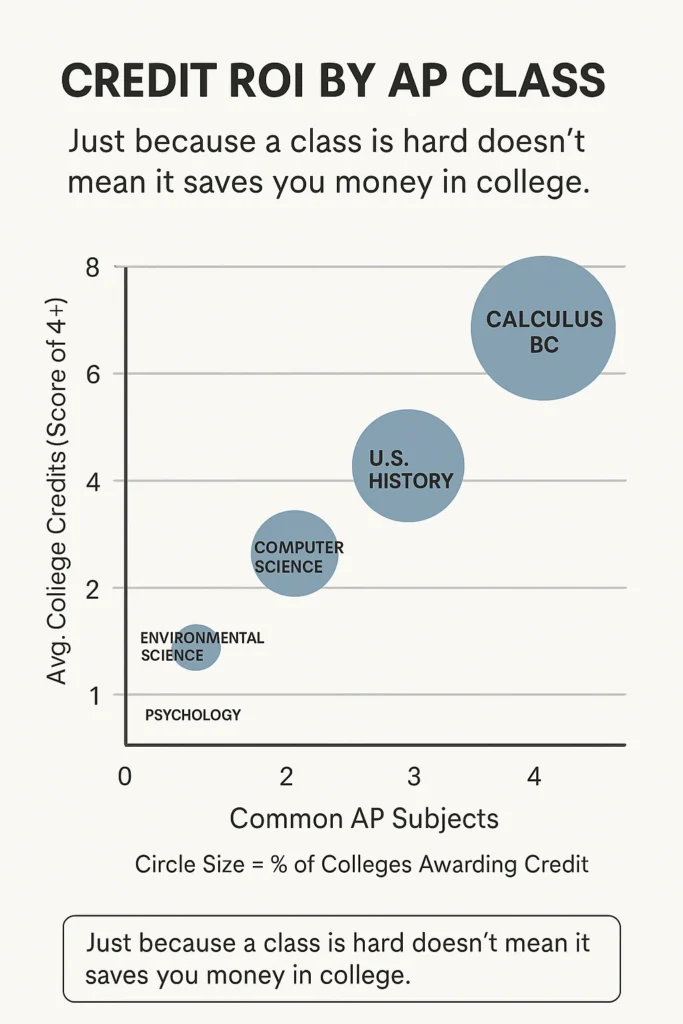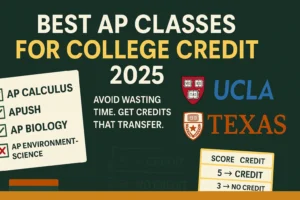Taking AP classes just to stack your transcript might feel smart, but here’s what most students (and even parents) miss — not all APs actually earn you college credit.
In 2025, over 1.25 million U.S. students took at least one AP exam, according to the College Board, yet fewer than 55% received scores that translated into real college savings. And guess what? Some top-tier schools like UCLA and Harvard only accept credit for specific AP subjects, and even then, only if you meet strict score cutoffs.
So, which AP classes are truly worth it? If your goal is to save thousands in tuition and skip intro classes in college, this post will break down:
- The AP subjects most widely accepted for credit
- Score cutoffs at top colleges (with real examples)
- Which APs get rejected most often (even with a 5!)
We’ll also include a visual guide comparing credit policies from schools like NYU, UT Austin, and UCLA — so you can plan smarter.
Not sure which APs match your strengths or college goals? This guide on the best AP classes to take breaks it down by major, admissions weight, and student feedback.
Not All AP Classes Are Created Equal
Just because a class is hard doesn’t mean it saves you money in college.
Here’s the thing — AP courses aren’t automatically accepted for credit. Each college decides which APs count, what minimum score they’ll take (usually a 4 or 5), and what kind of credit you’ll get: full credit, elective credit, or… nothing at all.
The College Board sums it up well:
“Each college and university makes its own decisions about awarding credit and placement. AP gives students the chance to earn credit — but it’s not guaranteed.”
— College Board, 2025 AP Credit Policy
In simple terms? Your AP score is like a coupon — some schools will honor it, others won’t.
How Many Colleges Actually Accept APs?
According to the College Board Credit Policy Search, over 3,800 colleges and universities in the U.S. offer some form of AP credit — but what they accept varies wildly.
Some give full credit for AP U.S. History (APUSH) with a 4. Others only accept Calculus BC with a 5 and ignore AP Environmental Science entirely.
Which APs Actually Save You College Tuition?
AP Calculus BC and AP Physics C offer higher average college credit hours than APUSH or AP Environmental Science. Visual highlights how not all AP classes translate equally into college savings.

New to APs? Check out our AP Class Selection Guide — perfect if you’re still deciding what to register for next semester.
AP Classes That Most Colleges Accept for Credit (2025 List)
Here’s a list of the AP classes that are most likely to get you college credit in 2025, based on actual credit policies from schools like UCLA, Harvard, and NYU.
Most Accepted AP Courses for Credit (2025)
| AP Course | Score Needed | Notes |
|---|---|---|
| AP Calculus BC | 4–5 | Skips Calc 1 + 2 at UCLA. Huge credit value if you’re STEM-bound. |
| AP English Language | 3+ | Most colleges offer 3–6 credits. Easier win than Lit. |
| AP Biology | 4–5 | Often used for general science credit, not always for major requirements. |
| AP Chemistry | 4–5 | Can skip Chem 1 at schools like Georgia Tech — but labs may still be required. |
| AP US History | 3–5 | Most public universities give credit for this. Helps with gen ed history. |
| AP Psychology | 3+ | Widely accepted for social science gen eds, even at selective colleges. |
| AP Statistics | 3–4 | Often counts for math/stat requirements, but rarely replaces Calc. |
| AP Computer Science A | 4–5 | Only some CS departments give major credit. Most give elective credit. |
| AP Environmental Science | Rarely | Not considered rigorous at top schools. Often rejected for science credit. |
| AP Human Geography | Rarely | Good for GPA boost in high school, but not valued in most college credit systems. |
Sources:
- UCLA AP Credit Chart (2025)
- Harvard Advanced Standing – AP Score Policy
Real College Credit Examples from Top Universities
Here’s what these colleges actually say about AP credit
Let’s stop guessing — here’s what the actual AP credit policies look like in 2025, straight from top university websites.
Harvard University
“AP exams are not used for placement in Gen Ed or concentration requirements. However, students with multiple scores of 5 may be eligible for Advanced Standing.”
🔗 Harvard AP Credit Guidelines (2025)
Example: AP Psychology = No Gen Ed credit, even with a 5
UCLA
“Most AP exams with scores of 3, 4, or 5 are granted unit credit, but not all apply to GE requirements.”
🔗 UCLA AP Credit Chart (2025)
Example: AP Biology = ✅ Unit credit for Life Sciences — only counts toward GE if you’re a science major
University of Michigan
“AP scores of 4 or 5 are generally required to receive credit. Some departments require a 5 for major credit.”
🔗 UMich AP Credit Guide (2025)
Example: AP Chemistry = ✅ Credit with 5, ⚠️ No credit for a 3
UT Austin
“AP exam credit is awarded based on department rules. Most courses require minimum score of 4 or 5.”
🔗 UT Austin AP Credit Policies (2025)
Example: AP U.S. History = ✅ 6 credits with a 4 or 5
If your goal is more about GPA than college credit, here’s a student-ranked list of the easiest AP classes that might be a better fit.
The AP Classes Most Likely to Save You Money
Let’s talk dollars.
In 2025, the average cost of a 3-credit course is around $1,050 at a public college and over $2,300 at private universities, according to the College Board Trends in College Pricing report.
That means even one AP exam that gets accepted can potentially save you a chunk of tuition.
Now imagine this: If you enter college with 15 credits from AP exams, that’s a full semester knocked off. At many universities, that could mean saving $10,000+ in tuition, housing, and meal plans — just for passing your APs with strong scores.
Top AP Classes With the Highest ROI
| AP Class | Avg. Credits Granted | Accepted at # of Colleges | ROI Potential |
|---|---|---|---|
| AP Calculus AB | 4–5 credits | 90%+ | High |
| AP Chemistry | 4–8 credits | 85%+ | High |
| AP U.S. History | 3–6 credits | 88% | Moderate |
| AP Biology | 4–8 credits | 80%+ | High |
| AP Psychology | 3 credits | 75% | Low–Moderate |
Tip: AP Calc and AP Chem often cover gen eds AND prerequisites — double value.
“I saved over $9K because my school gave full credit for AP Calc AB and AP Chem. Walked in as a second-semester freshman!”
– u/pre-med-anon on r/APStudents
FAQs On AP Classes And College Credit
Does “easiest” equal college credit?
Not always! Passing an AP exam doesn’t guarantee credit. Many top colleges only grant credit for core courses like Calc BC, English, or high-level science APs—even if easier APs like Psych or Human Geo are favorites.
“AP CSP and Psych were easy GPA boosters, but my college didn’t accept them for credit.” — Redditor comment
Which APs actually transfer at top schools in 2025?
Nearly every top university grants credit most often for:
AP Calculus BC
AP English Language or Literature
AP Statistics, Government, Psychology
AP Bio or Chemistry if you score a 5 and nearby schools like UCLA still sometimes don’t accept a 4 Reddit+15
Can I self‑study and still earn credit?
Yes. AP Psychology, Human Geography, and CSP are often self-studied with success—especially when you combine official resources (College Board free-response/practice questions) with Reddit advice
Plan APs That Actually Pay Off
If there’s one thing I’ve learned from digging into AP transfer data and Reddit threads from real college students, it’s this: just taking a ton of APs isn’t the smartest move — but choosing the right ones can literally save you a semester’s worth of tuition.
In my opinion, if you’re aiming for UC schools, top privates like NYU, or even competitive public schools like UT Austin, it’s worth sitting down and checking each school’s AP credit chart before committing to a class. Some parents assume a 5 always counts — but as we’ve seen, that’s not always the case. Schools like Harvard may give placement, not credit, which means zero tuition savings.
Here’s what I’d recommend:
- Choose core APs like AP Calc, AP Lang, APUSH, and AP Bio — they’re more likely to transfer.
- Double-check AP credit policies using tools on each college’s site or this College Board credit search tool.
Bonus: Download our “AP Credit Planner for 2025” to map your ideal AP track by major.
It includes college-specific policies, sample plans, and the APs most likely to transfer.

Nawab, an educator teaching K-12 since 2010, holds an English honors graduate degree and a diploma in elementary education. He has also been blogging for five years, sharing insights for educators and parents.

